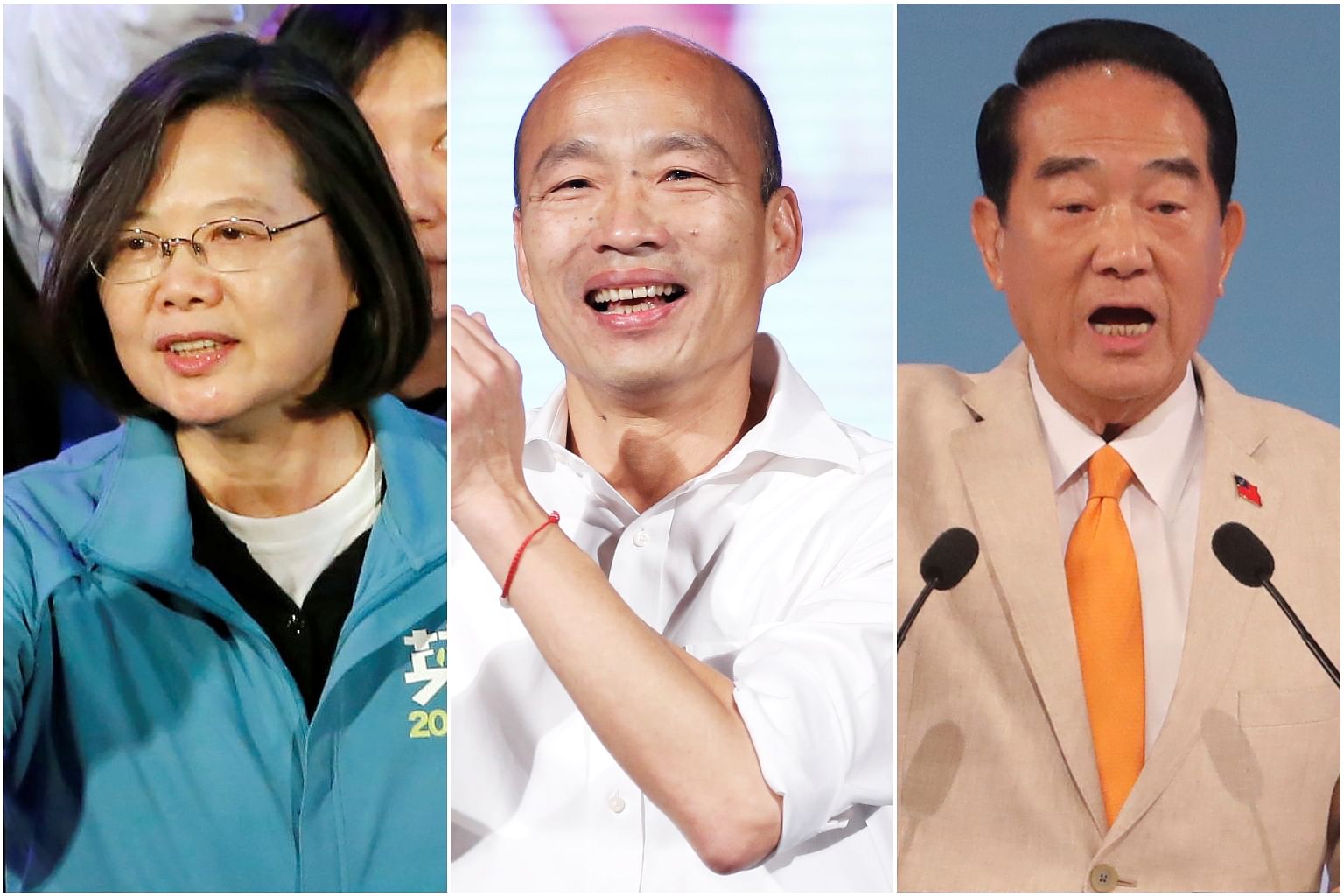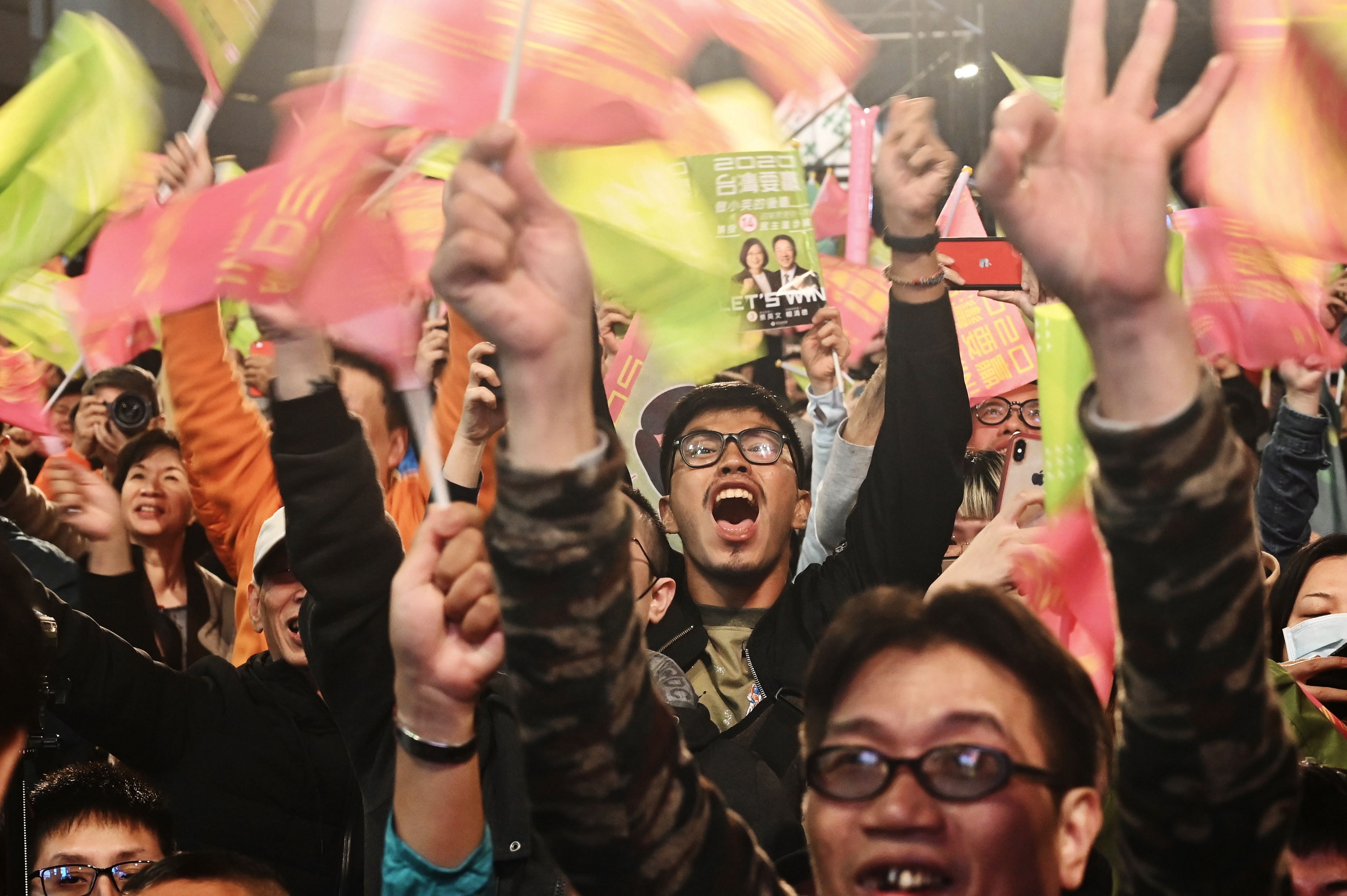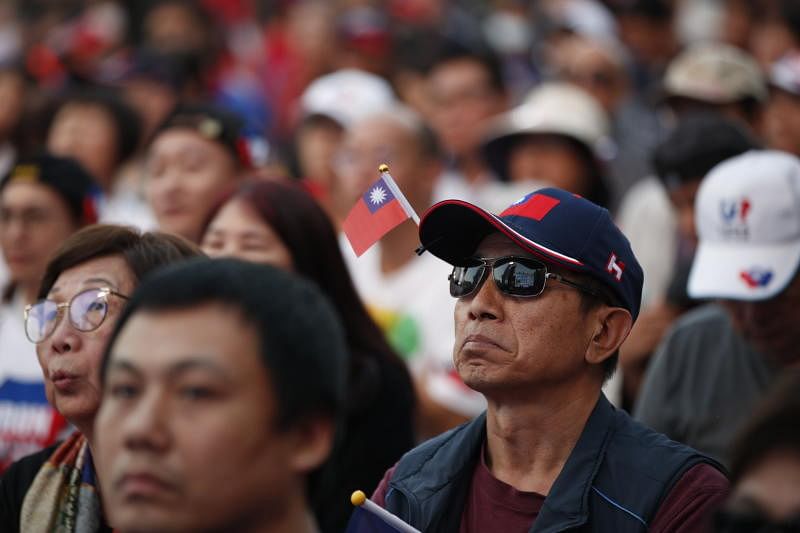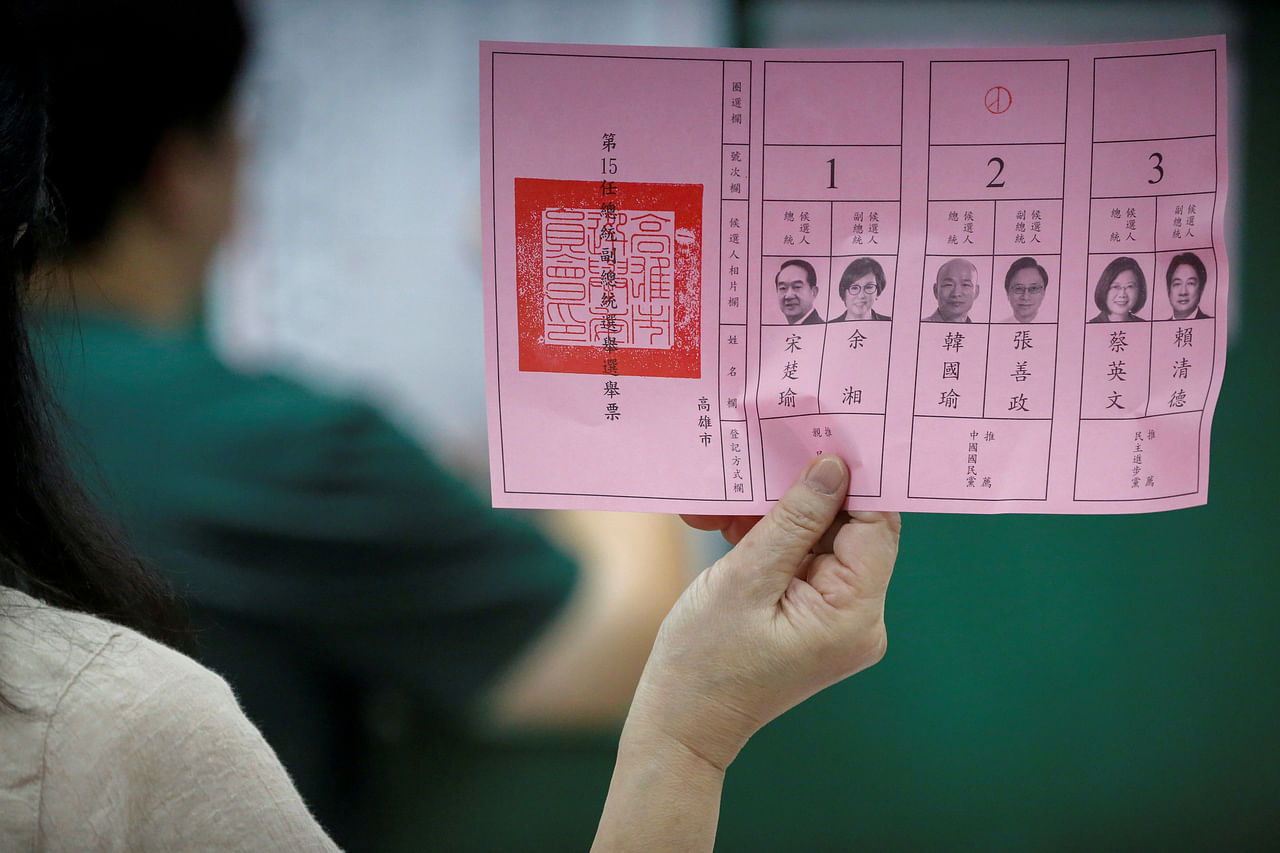Taiwan Elections: Tsai Ing-wen re-elected president with 57% of vote in final tally, says China must stop threats of force
Sign up now: Get ST's newsletters delivered to your inbox
Katherine Wei
Follow topic:
TAIPEI - Taiwan's pro-independence President Tsai Ing-wen declared victory in the election on Saturday (Jan 11) that handed her a second term, saying the results clearly showed that Taiwanese people reject the "one country, two systems" formula and calling on China to abandon its threats of force against the island.
"Taiwan is showing the world how much we cherish our free democratic way of life and how much we cherish our nation," Ms Tsai told reporters as she announced her victory shortly after her Kuomintang (KMT) rival Han Kuo-yu conceded defeat.
Final results from the Central Election Commission showed Ms Tsai winning 57 per cent or 8.17 million of the votes, almost 20 per cent more than Mr Han. Mr James Soong of People First Party had some 4 per cent or 600,000 votes.
Ms Tsai's win broke former President Ma Ying-jeou's record of 7.65 million votes in 2008. She won the 2016 presidential election with more than 56 per cent of the votes, becoming the island's first female president.
In a Facebook post on Saturday night, Ms Tsai said, "Lastly, I would like to thank those who did not vote for me. I know all of you have not been satisfied with my performance in the past three years. But in the next four years, I will strive with sincerity to win acknowledgement and trust from each and every one of you. We are all Taiwanese, and all Taiwanese people are family."
Mr Han conceded defeat just before 9pm at his headquarters in the southern port city of Kaohsiung. He told disappointed supporters that he had called to congratulate Ms Tsai on her victory. He vowed to return to his job as mayor with renewed vigour.
"The people have made their decision, and as candidates, we must respect the results. I can only say I haven't worked hard enough," said Mr Han, who called for the island to put aside its differences.
"Tomorrow when we wake up to a new day, we hope to see a united Taiwan, no matter your occupation or where you live….those who love Taiwan the most in the world, are the Taiwanese people."
Meanwhile, the United States congratulated Ms Tsai for her re-election Saturday, hailing it as a demonstration of the self-ruled island's "robust democratic system."
The State Department praised Ms Tsai for developing a strong partnership with Washington and for her "commitment to maintaining cross-Strait stability in the face of unrelenting pressure."
"Under her leadership, we hope Taiwan will continue to serve as a shining example for countries that strive for democracy, prosperity, and a better path for their people," it said.
It also congratulated Taiwan "for once again demonstrating the strength of its robust democratic system, which - coupled with a free market economy and a vibrant civil society - makes it a model for the Indo-Pacific region and a force for good in the world."
The mood at the DPP headquarters in Taipei was festive, as Ms Tsai's supporters cheered each time the numbers were updated. In Kaohsiung city where Mr Han is mayor, the mood among his supporters was sombre.
Voter turnout was expected to be higher than the 66 per cent four years ago because of the closely contested race and good weather. Some 19 million people were registered to vote.
Ms Tsai's popularity rating rose in the past few months because of the unrest in Hong Kong, Beijing's reiteration of reunification through the "one country, two systems" formula unpopular with Taiwanese and an improving economy.
After casting her ballot on Saturday morning, Ms Tsai said she hoped every Taiwanese "can vote today to make democracy in Taiwan stronger".
KMT Chairman Wu Den-yih, who cast his vote in Banqiao, Taipei, said he hoped for the elections to go "safely, smoothly and fairly". He added that he has confidence in his party.
Mr Han was seen casting his ballot in Kaohsiung with his daughter but declined to speak to the media.
Mr Soong, who voted in Tamsui in New Taipei City, said: "I am proud to be Taiwanese. The elections are so peaceful, (we) are demonstrating Taiwan's model democracy and paving way for Taiwan's true future with reason and with our own feet."
'Battle Between Generations'
According to the island's Central Election Committee data, there are about 20 million eligible voters this year, with nearly one in five (19.38 per cent) in their 40s - the biggest group - followed by voters in their 50s at 18.81 per cent.
This election is dubbed the "battle between the generations" by local media, as middle-aged and older voters form the bulk of support for China-friendly Mr Han, 62, who is also Kaohsiung Mayor, and the younger generation has put its support behind independence-leaning Ms Tsai, 63.
Local polls have put Mr Soong, 77, a veteran who is running for president for the fourth time - at last place, with the smallest chance of winning.
The election results may very well be affected by the turnout rate of Taiwan's youth.

In Ms Tsai's first election victory in 2016, only 57.73 per cent of eligible young voters aged between 20 and 39 cast their ballots. In comparison, more than seven in 10 voters in their 40s and 50s turned up at the polls.
But this year, the "dried mango" threat may push younger voters to turn up and vote.
Mangguogan, or "dried mango" is a popular snack among Taiwanese, but sounds like and is used politically to mean "wangguogan" or "sense of a nation's doom" or, to Taiwanese, "end of Taiwan as we know it".
It is something Taiwan's youth have reported feeling if the day comes when China's "one country, two systems" policy in Hong Kong is imposed on the island.
Ms Lin Le-hsuan arrived at her polling station in Da-an district at 7am, an hour before polls opened.
The 29-year-old, who works for a theatre group in Pittsburgh in the United States, flew back to Taiwan in late December to spend her limited leave days with her family.
Munching her breakfast while standing in line outside the polling station, she said she wanted to be one of the first to vote so she could catch an early flight back to the US.
"I could only get an additional five days off after the Christmas holidays in order to be here to vote," said Ms Lin, who had to be at the airport in less than an hour after she cast her ballot.
"I'm so touched to see so many people my age flying back to Taiwan to vote this year. This proves that young people in my generation haven't forgotten or given up on Taiwan," she told The Straits Times.

Supporters of Taiwan President Tsai Ing-wen celebrate outside the campaign headquarters in Taipei on Jan 11, 2020.
PHOTO: AFP
She was among the 5,328 Taiwanese living overseas who have applied to return to vote this time, compared with the 2,425 in 2016. Taiwan does not accept absentee ballots.
Mr Michael Peng, 71, declined to say whom he voted for as he walked out of his polling station in Taipei's Xinyi district.
"I'll say one thing: it's no easy feat to do what Xiao Ing has done, cutting the civil service pension like that...but it had to be done or Taiwan's welfare systems like the universal healthcare would go bankrupt," said the retired banker, using the nickname used by the media and Taiwanese to refer to Ms Tsai.
He said he couldn't keep track of how many local and general elections he has voted in, but he made a point to vote in every election after Taiwan held its first direct presidential election in 1996.
In a final push to woo voters, the two main parties KMT and DPP held massive rallies on Thursday and Friday nights respectively as huge crowds gathered in a dazzling sea of flags - green and pink for Ms Tsai, red and blue for Mr Han.

Supporters of Taiwan's Kuomintang party's presidential candidate Han Kuo-yu follow the online counting of ballots during the presidential election, in Kaohsiung, on Jan 11, 2020.
PHOTO: EPA-EFE
"This election will determine if Taiwanese people can bravely choose democracy and freedom despite pressure from China," Ms Tsai told supporters.
Mr Han, on the other hand, told his crowd it was time to mend ties with Beijing.
"Interactions between the two sides of the Taiwan Strait have become frosty and are at their lowest ebb," he said.
'Election tourists' from Hong Kong
Coming on the back of about seven months of unrest in Hong Kong, the elections in Taiwan are receiving more attention than usual from Hong Kongers. Many have decided to visit Taiwan during the week of the elections to celebrate its democracy and freedom to vote.
A 33-year-old civil engineer, who wished to be identified only by his surname Kwok, attended Ms Tsai and the DPP's rally on Friday night with seven friends from Hong Kong. "We're here for five days, just to see Taiwan's presidential elections! A lot of Hong Kongers are doing the same thing," said Mr Kwok.
They also attended non-partisan legislator candidate Freddy Lim's rally on Thursday night but did not have time to attend a KMT rally.
The group of friends, all in their 20s and early 30s, attended the rallies with a flag that reads "Free Hong Kong - Revolution Now", a popular slogan for the protests in the Special Administrative Region.
Mr Kwok and his friends have been participating in the Hong Kong protests and say Taiwanese people should vote because they can. "Taiwanese people should make the most of what you have now and don't give up (on voting)," said Mr Kwok.

An election official shows a ballot with a vote for Kuomintang party's presidential candidate Han Kuo-yu as votes are counted at a polling station in Kaohsiung, on Jan 11, 2020.
PHOTO: X06716
The polls are also closely watched by foreign media, researchers and scholars because of the Tsai administration's tense relationship with China.
There were more than 113 foreign news organisations covering the elections and 13 foreign election observation groups in Taiwan as of Friday.
Mr Liu Feng-yi, a PhD candidate studying social welfare at Rutgers University, amassed a team of overseas Taiwanese in New York and neighbouring cities to produce a series of videos calling on fellow overseas Taiwanese to go home and vote.
"I am doing this to defend Taiwan's democracy," he said.
Aside from the president and vice-president, voters are also voting for legislators, as well as casting a "political party vote" that parties can use to gain at-large legislature seats according to the percentage of party votes they receive.
This year, there are 19 parties vying for the at-large seats, a record high in Taiwan's history of legislature elections, something that the DPP and KMT have feared would split the party votes that traditionally went to the two larger parties.
With the political party vote, many young people have said that they are opting to vote for smaller, newer parties that have younger at-large candidates that will bring balance to the largely middle-aged legislature, and also break the two major parties' control of the legislature.

